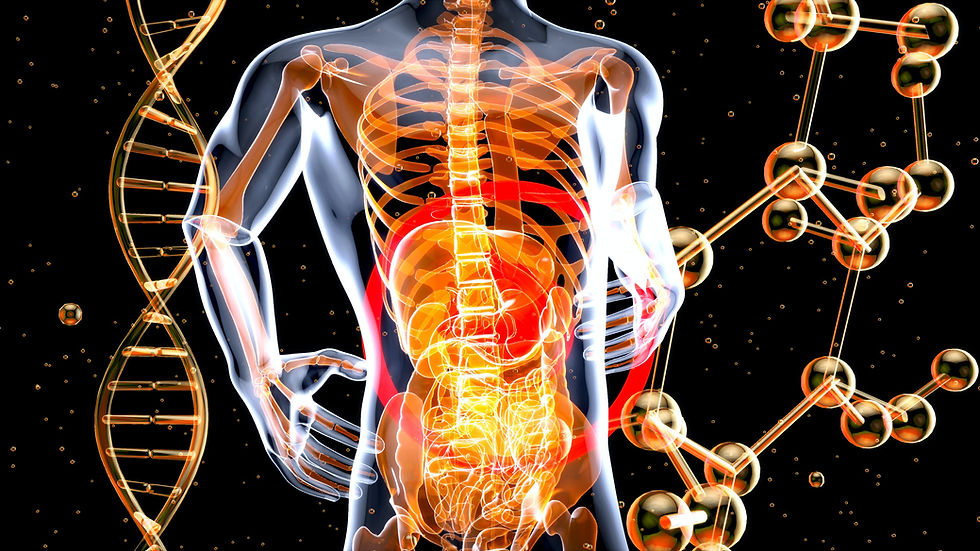GUT INSTINCTS
- Sandy Flynn
- Feb 6, 2024
- 5 min read
In the last few years, the importance of the gut in overall health and well-being has exploded on every front. Research shows the gastrointestinal tract doesn’t just play a crucial role; it is called our second brain. The complex community of microorganisms known as the gut microbiota is responsible for disease prevention, metabolism and weight regulation, nutrient absorption and digestion, mood and mental health, and immune system support and response. Now that we understand the link between poor gut health and illness, it should come as no surprise that studies reveal our guts are in trouble. Poor diet, processed food, chronic stress, OTC and prescription medication, antibiotic overuse, and sleep deprivation are the culprits. So, is it possible to reset your gut? Can you reverse the damage, repair imbalanced microbiota, and regain your health? Let’s find out:

I was kind of a sickly kid. I had frequent ear infections. They got so bad I had to have tubes in my ears twice! I was prone to all kinds of infections. Respiratory, sinus, urinary, bladder, yeast. I was ALWAYS on antibiotics. My diet was pretty much sugar and processed food. My parents made healthy dinners but I wouldn't eat anything green or anything that remotely resembled a vegetable. As I got older, though my diet improved (except on the sugar front), my constitution only deteriorated. If I got a sniffle, it immediately spiraled into full-fledged sickness. My body had zero immune response. A cold would turn into a respiratory infection. A normal Z-pack was never enough to cure the infection. I required a 10-day course of antibiotics each and every time. Often, doctors would throw in steroids in an attempt to jumpstart my system. Steroids would completely throw my system into chaos. After years on this merry-go-round of sickness, I sought help. The most interesting thing I learned is until I addressed my diet and in turn healed my gut, it didn't matter what supplement, mushroom, tea, powder, or cure-all tonic I took, it would be almost impossible to get a handle on my issues and restore my health.
Symptoms and indicators
An imbalanced and unhealthy gut can manifest through various signs and symptoms.
Common signs of an imbalanced gut:
Digestive Issues: Persistent digestive problems such as bloating, gas, constipation, diarrhea, or abdominal discomfort may indicate an imbalance in the gut microbiota.
Food Intolerances: Developing new or heightened sensitivities to certain foods may be a sign of an unhealthy gut. This can include reactions like nausea, headaches, or other discomfort after eating specific foods.
Changes in Weight: Unexplained weight changes, whether weight gain or loss, without significant changes in diet or exercise, could be linked to gut health issues.
Fatigue and Low Energy: An imbalanced gut may impact nutrient absorption, leading to fatigue and decreased energy levels.
Skin Issues: Conditions like acne, eczema, or other skin problems may be related to gut health. The skin reflects the overall health of the body, and disruptions in the gut can sometimes manifest on the skin.
Mood Disturbances: The gut-brain connection is strong, and an unhealthy gut may contribute to mood swings, anxiety, or depression. The gut produces neurotransmitters that influence mood.
Sleep Problems: Disruptions in the gut can affect sleep patterns. If you're experiencing difficulties falling asleep or staying asleep, it might be related to gut health.
Autoimmune Conditions: Some autoimmune diseases have been linked to imbalances in the gut microbiome. If you have an autoimmune condition, addressing gut health may be beneficial.
Joint Pain: Inflammation in the gut can sometimes lead to joint pain or exacerbate existing joint issues.
Frequent Infections: A compromised immune system, often associated with an unhealthy gut, may result in frequent colds, infections, or illnesses.
Rest & Reset
Improving gut health involves adopting habits that promote a balanced and diverse gut microbiome.
Here are some tips to help "rest" your gut and improve gut health:
Dietary Fiber: Consume a variety of fiber-rich foods, including fruits, vegetables, whole grains, and legumes. Fiber serves as a prebiotic, supporting the growth of beneficial bacteria in the gut.
Probiotics: Include fermented foods like yogurt, kefir, sauerkraut, kimchi, and miso in your diet. These foods contain probiotics, which are beneficial bacteria that contribute to gut health.
Prebiotics: Incorporate prebiotic-rich foods such as garlic, onions, leeks, bananas, and asparagus. Prebiotics provide the necessary fuel for the growth and activity of beneficial gut bacteria.
Hydration: Drink plenty of water to support overall digestive function. Staying hydrated helps maintain the mucosal lining of the intestines, supporting a healthy gut barrier.
Limit Processed Foods: Reduce the intake of processed foods, as they often contain additives that may negatively impact gut health. Opt for whole, unprocessed foods whenever possible.
Mindful Eating: Practice mindful eating by paying attention to hunger and fullness cues. Eating slowly and chewing food thoroughly can aid digestion.
Regular Exercise: Engage in regular physical activity, as it has been linked to a more diverse and beneficial gut microbiota.
Adequate Sleep: Prioritize sufficient and quality sleep, as disrupted sleep patterns can affect the gut microbiome.
Stress Management: Chronic stress can impact gut health. Practice stress-reducing techniques such as meditation, deep breathing, or yoga.
Avoid Antibiotics Unless Necessary: Antibiotics can disrupt the balance of gut bacteria. Only use antibiotics when prescribed by a healthcare professional, and follow their instructions.
The Sugar Factor
The relationship between sugar consumption and gut health is complex, and the impact can vary among individuals. For me, until I addressed my sugar addiction, I could not regain control of my health. While there is no one-size-fits-all answer, reducing excessive sugar intake can contribute to improving gut health for many people.
Here are some reasons why limiting sugar intake is beneficial for gut health:
Microbial Balance: Excessive sugar consumption can alter the balance of microorganisms in the gut. Some studies suggest that a diet high in sugar may promote the growth of harmful bacteria at the expense of beneficial bacteria.
Inflammation: High sugar intake has been associated with increased inflammation, and chronic inflammation in the gut can contribute to various digestive issues and negatively impact gut health.
Increased Permeability: Some research suggests that a diet high in added sugars may contribute to increased intestinal permeability, often referred to as "leaky gut." This condition allows substances to pass through the intestinal lining, potentially triggering an immune response.
Dysbiosis: Dysbiosis refers to an imbalance in the gut microbiota. Consuming excess sugar may create an environment that favors the growth of harmful microbes, disrupting the delicate balance of the microbiota.
Gut-Brain Axis: There is evidence that excessive sugar intake may influence the gut-brain axis, impacting mood and cognitive function through gut microbiota interactions.
It's important to note that not all sugars have the same effects on the gut. Naturally occurring sugars in whole fruits, vegetables, and other unprocessed foods may have different impacts than added sugars found in processed and sugary foods.
If you're considering reducing sugar intake to improve gut health, here are some tips:
Focus on whole, unprocessed foods.
Read food labels to identify and limit added sugars.
Choose natural sweeteners in moderation.
Increase fiber intake from fruits, vegetables, and whole grains.
Say NO to diet soda! Eliminate artificial sweeteners and fake sugar.
Individual responses to dietary changes may vary, and consulting with your doctor or a healthcare professional can provide personalized advice based on your specific health needs.
Tiny Tip: There is never a singular path a person can or should take on the journey to holistic health. It is IMPERATIVE you be your own advocate and find what works and doesn’t work for you. Trial and error through addition and elimination has been a vital tool for me. If you want more info about the methods I implemented to find my way and regain my health, please reach out.



Comments